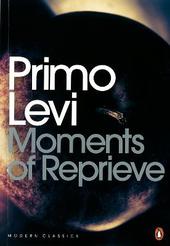
|
Moments of Reprieve
Paperback / softback
Main Details
| Title |
Moments of Reprieve
|
| Authors and Contributors |
By (author) Primo Levi
|
|
Introduction by Michael Ignatieff
|
|
Translated by Ruth Feldman
|
| Series | Penguin Modern Classics |
|---|
| Physical Properties |
| Format:Paperback / softback | | Pages:176 | | Dimensions(mm): Height 198,Width 129 |
|
| Category/Genre | Short stories |
|---|
| ISBN/Barcode |
9780141186979
|
| Classifications | Dewey:853.914 |
|---|
| Audience | |
|---|
|
Publishing Details |
| Publisher |
Penguin Books Ltd
|
| Imprint |
Penguin Classics
|
| Publication Date |
26 September 2002 |
| Publication Country |
United Kingdom
|
Description
Primo Levi was one of the most astonishing voices to emerge from the twentieth century: a man who survived one of the ugliest times in history, yet who was able to describe his own Auschwitz experience with an unaffected tenderness.Levi was a master storyteller but he did not write fairytales. These stories are an elegy to the human figures who stood out against the tragic background of Auschwitz, 'the ones in whom I had recognized the will and capacity to react, and hence a rudiment of virtue'. Each centres on an individual who - whether it be through a juggling trick, a slice of apple or a letter - discovers one of the 'bizarre, marginal moments of reprieve'.
Author Biography
Primo Levi was born in Turin in 1919. The son of an educated middle-class Jewish family, he graduated with a degree in chemistry and found a job as a research chemist in Milan. In December 1943, he was arrested as part of the anti-fascist resistance and deported to Auschwitz. After the war, Levi resumed his career as a chemist, retiring only in 1975. His graphic account of his time in Auschwitz, If This Is a Man, was published in 1947 and he went on to write many other books, including If Not Now, When? and The Periodic Table, emerging not only as one of the most profound and haunting commentators on the Holocaust, but as a great writer on many twentieth-century themes. In 1987, Primo Levi died in a fall that is widely believed to have been suicide.
|